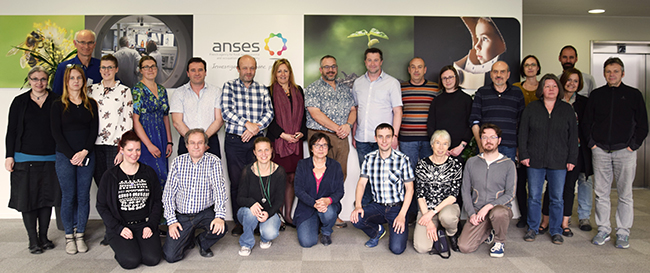
6th Meeting of the EPPO Panel on Diagnostics in Virology and Phytoplasmology
Maisons-Alfort (FR), 2019-05-21/23
The 6th meeting of the EPPO Panel on Diagnostics in Virology and Phytoplasmology took place in Maisons-Alfort (FR) at the kind invitation of the French Agency for Food, Environmental and Occupational Health and Safety (ANSES). The EPPO Secretariat was pleased to welcome new experts from Belgium, Estonia, Greece, Poland and the United Kingdom. The Panel continued its task of developing Diagnostic Protocols for regulated viruses, viroids and phytoplasmas.

Participants – The composition of the EPPO Panel on Diagnostics in Virology
and Phytoplasmology can be found on the EPPO website
Discussions on Diagnostic Protocols
Alignment of the EPPO Diagnostic Protocols with IPPC Protocols
The alignment of the EPPO Diagnostic Protocol Plum pox potyvirus (PM 7/032) with the IPPC Protocol (ISPM 27 Annex 2) was discussed. The Panel agreed to put on hold the revision and to wait for the results of the Test Performance Study (TPS) organised in the framework of the EU-funded project ‘Validation of diagnostic tests to support plant health (VALITEST)’ that will provide validation data on the tests to be considered for the revised Diagnostic Protocol. The alignment of the EPPO Diagnostic Protocol Citrus tristeza closterovirus (PM 7/031) with the IPPC Protocol (ISPM 27 Annex 15) was also put on hold to wait for validation data from the VALITEST project.
Revision of EPPO Diagnostic Protocols
The Panel discussed the following pest-specific Diagnostic Protocols:
- EPPO Diagnostic Protocol Beet necrotic yellow vein virus (PM 7/030(2)). A revised version of the Diagnostic Protocol, prepared in line with the discussions held during the Panel meeting, will be sent for country consultation during summer 2019.
- EPPO Diagnostic Protocol Tomato ringspot nepovirus (PM 7/049). The Panel discussed the tests to include in the revision. Some experts from the Panel volunteered to review the Diagnostic Protocol before country consultation.
Review of EPPO Diagnostic Protocols after Country Consultation
- EPPO Diagnostic Protocol ‘Candidatus Phytoplasma mali’, ‘Ca. Phytoplasma pyri’ and ‘Ca. Phytoplasma prunorum’ (PM 7/062(2)). The comments received during country consultation and modifications suggested by the authors to address these comments were reviewed. The Diagnostic Protocol was finalized and sent for the formal objection stage on 2019-05-28.
- Diagnostic Protocol on the generic detection of Pospiviroids. The Panel discussed the comments received during country consultation. It was agreed that tests for Potato spindle tuber viroid and Chrysanthemum stunt viroid should be described in the Appendices. The Diagnostic Protocol will be finalised by the drafting team, reviewed by the Panel and sent for the formal objection stage by the end of 2019-06.
-
Diagnostic Protocol on the generic detection of Tospoviruses. The Panel discussed the comments received during country consultation. The Diagnostic Protocol will be finalised and sent for the formal objection stage by mid 2019-06.
New EPPO Diagnostic Protocol in preparation
Diagnostic Protocol on the generic detection of Begomoviruses. The Panel was informed that a TPS is currently being organised in the framework of the Euphresco project 2016-A-212 ‘Assessment of a generic method for the detection of Begomoviruses (BegomoVal)’. Results are expected by early 2020. The drafting team will prepare a Diagnostic Protocol if possible during the first semester of 2020. A face to face meeting could be organised in 2020-05, if needed.
Priorities for revision of Diagnostic Protocols
The Panel reviewed the list of EPPO Diagnostic Protocols in Virology and Phytoplasmology and the following proposals for revision were made:
- Cucumber vein yellowing virus (PM 7/081): new tests were published, including a real-time RT-PCR and an ELISA that justify the revision of the Diagnostic Protocol. A teleconference will be organized in 2020-02 to discuss the draft revision.
- Pepino mosaic virus (PM 7/113): the Diagnostic Protocol will be revised to include the new tests developed such as lateral-flow devices. The Panel noted that as mild strains are now used to cross-protect plants and cannot be distinguished from other strains, the protocol is consequently mainly needed for testing seeds and seedlings. An Expert Working Group meeting will be organized in early 2020.
Priorities for new Diagnostic Protocols
The Panel agreed on priorities for new Diagnostic Protocols, as follows:
- Tomato brown rugose fruit virus: experts to involve in the drafting of the Diagnostic Protocol were identified. An Expert Working Group meeting will be organized early in 2020. The Panel was informed that a webinar on Tomato brown rugose fruit virus was organised by the UK Agriculture and Horticulture Development Board. Information can be found on the AHDB website
 .
. - ‘Candidatus Phytoplasma phoenicium’: the Panel agreed to wait for the results of the Euphresco project 2017-F-234 ‘Reliable detection protocols for the specific identification of ‘Candidatus Phytoplasma phoenicium’ and to discuss the need for a Diagnostic Protocol on the pest at the next Panel meeting in 2020-11.
General discussions
Update on Euphresco
The Panel was informed of reports of the Euphresco projects recently published. The research topics proposed for transnational collaboration in 2019 were also discussed.
Cq vs Ct for real-time PCR tests
Regarding the instruction to authors of Diagnostic Protocols, the Panel discussed the recommendation to use Ct rather than Cq in Diagnostic Protocols. The Panel comments will be raised with the Panel on Diagnostics and Quality Assurance.
The next meeting of the Panel on Diagnostics in Virology and Phytoplasmology will be held in 2020-11.
